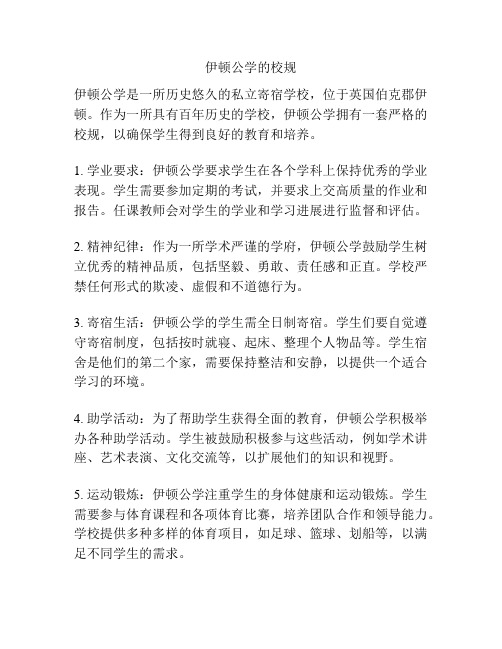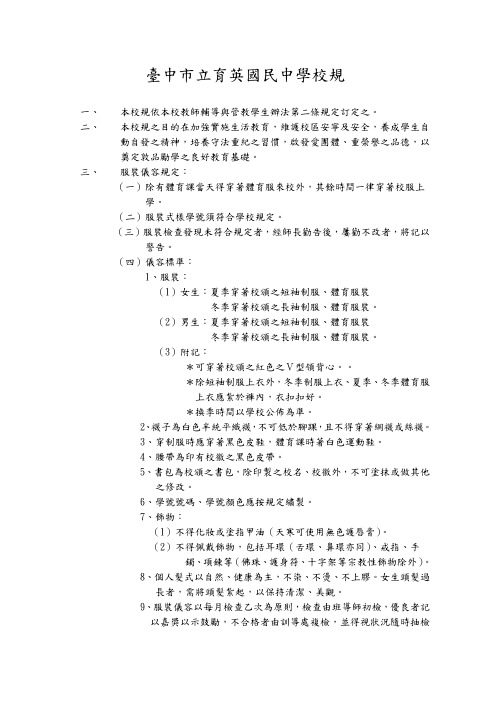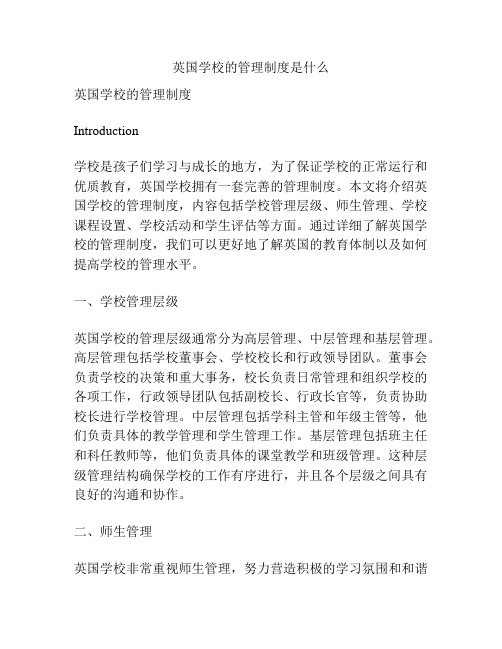英国中学校规
伊顿公学的校规

伊顿公学的校规伊顿公学是一所历史悠久的私立寄宿学校,位于英国伯克郡伊顿。
作为一所具有百年历史的学校,伊顿公学拥有一套严格的校规,以确保学生得到良好的教育和培养。
1. 学业要求:伊顿公学要求学生在各个学科上保持优秀的学业表现。
学生需要参加定期的考试,并要求上交高质量的作业和报告。
任课教师会对学生的学业和学习进展进行监督和评估。
2. 精神纪律:作为一所学术严谨的学府,伊顿公学鼓励学生树立优秀的精神品质,包括坚毅、勇敢、责任感和正直。
学校严禁任何形式的欺凌、虚假和不道德行为。
3. 寄宿生活:伊顿公学的学生需全日制寄宿。
学生们要自觉遵守寄宿制度,包括按时就寝、起床、整理个人物品等。
学生宿舍是他们的第二个家,需要保持整洁和安静,以提供一个适合学习的环境。
4. 助学活动:为了帮助学生获得全面的教育,伊顿公学积极举办各种助学活动。
学生被鼓励积极参与这些活动,例如学术讲座、艺术表演、文化交流等,以扩展他们的知识和视野。
5. 运动锻炼:伊顿公学注重学生的身体健康和运动锻炼。
学生需要参与体育课程和各项体育比赛,培养团队合作和领导能力。
学校提供多种多样的体育项目,如足球、篮球、划船等,以满足不同学生的需求。
6. 社团和俱乐部活动:伊顿公学鼓励学生积极参与社团和俱乐部活动。
学生可以选择自己感兴趣的项目,比如音乐、戏剧、舞蹈、辩论等,以开发他们的才能和兴趣爱好。
7. 社交礼仪:作为一所培养未来领袖的学校,伊顿公学注重培养学生的社交礼仪和人际交往能力。
学生需要尊重他人、友善待人,并注意自己的言行举止,以树立良好的人际关系。
8. 校服要求:伊顿公学对学生的着装有着严格的要求。
学生需要穿戴整齐、干净的校服,并注意个人卫生和仪容。
9. 课余时间:除了学业和课程,伊顿公学鼓励学生充分利用他们的课余时间。
学生可以选择参加学校组织的活动、阅读、参观博物馆和艺术展览、结交新朋友等,以培养他们的兴趣和才华。
10. 纪律处分:伊顿公学对违反校规的学生会采取相应的纪律处分措施,包括口头警告、书面警告、校内停留、社会禁闭等。
英国学生法律规定(3篇)

第1篇一、引言英国作为世界教育强国,其教育体系严谨,法律法规完善。
为了保障学生的权益,维护教育秩序,英国制定了相应的学生法律规定。
本文将从以下几个方面对英国学生法律规定进行详细阐述。
二、学生权利与义务1. 学生权利(1)受教育权:学生有权接受正规、全面的教育,包括基础教育、职业教育和高等教育。
(2)平等权:学生享有平等的教育机会,不受性别、种族、宗教、残疾等因素的限制。
(3)言论自由权:学生在学校内部有权表达自己的观点,参与学校事务。
(4)隐私权:学生有权保护个人隐私,包括个人信息、学习成绩等。
(5)安全权:学校有责任保障学生的安全,包括人身安全、财产安全等。
2. 学生义务(1)遵守学校规章制度:学生应遵守学校的各项规章制度,包括作息时间、课堂纪律等。
(2)尊重师长:学生应尊敬师长,遵循教师的教育教学指导。
(3)勤奋学习:学生应珍惜学习机会,努力学习,提高自身素质。
(4)团结友爱:学生应团结友爱,相互帮助,共同进步。
(5)遵纪守法:学生应遵守国家法律法规,维护社会秩序。
三、英国学生法律体系1. 英国宪法英国宪法规定了英国的基本政治制度、国家权力机构及其职责,为教育立法提供了基础。
2. 英国教育法英国教育法是英国教育领域的核心法律,规定了教育机构、教育经费、教育质量等方面的内容。
3. 学校章程学校章程是学校内部管理的规范性文件,规定了学校的组织结构、教育教学、学生管理等方面的内容。
4. 学校规章制度学校规章制度是学校内部管理的具体规定,包括学生行为规范、作息时间、考试纪律等。
四、英国学生法律制度的主要内容1. 学生入学与转学(1)入学条件:英国学生入学需满足相应年龄、教育程度等条件。
(2)转学规定:学生转学需遵循相关规定,包括申请流程、转学手续等。
2. 学生成绩与评价(1)成绩评定:英国学校采用多种评价方式,如考试、作业、平时表现等。
(2)成绩复核:学生有权申请复核成绩,学校应予以配合。
3. 学生行为规范(1)课堂纪律:学生应遵守课堂纪律,尊重师长,不打扰他人。
伊顿公学的校规

伊顿公学的校规
【原创版】
目录
1.伊顿公学的简介
2.伊顿公学的校规内容
3.校规的执行与影响
4.校规对学生的教育意义
5.结论
正文
伊顿公学是英国最著名的男子私立学校之一,以其卓越的教育质量和独特的教育理念闻名于世。
学校对学生的教育管理非常严格,其中校规是学生必须遵守的行为准则。
伊顿公学的校规内容非常详细,涵盖了学生在校期间的各个方面。
比如,学生必须按时起床、按时就寝,穿着要整洁大方,不能穿奇装异服。
学生在上课期间必须认真听讲,不能玩手机或做其他与学习无关的事情。
此外,学校还规定了学生的言行举止,比如不能说粗俗的语言,不能有粗鲁的行为等。
伊顿公学的校规执行非常严格,学生一旦违反规定,就会受到相应的处罚。
轻者会被警告,重者会被开除。
这种严格的管理方式,使得学校的教学秩序非常好,学生的学习效果也非常显著。
校规对学生的教育意义非常重大。
首先,校规的执行可以帮助学生养成良好的生活习惯和行为习惯,这对于他们的健康成长非常有益。
其次,校规的执行可以帮助学生形成正确的价值观,使他们明白什么是对的,什么是错的。
最后,校规的执行可以帮助学生培养良好的团队合作精神,使他们明白在团队中,个人行为会影响到整个团队的利益。
总的来说,伊顿公学的校规对于学生的教育和成长起到了非常重要的作用。
8237-台中市立育英国中校规

臺中市立育英國民中學校規一、本校規依本校教師輔導與管教學生辦法第二條規定訂定之。
二、本校規之目的在加強實施生活教育,維護校區安寧及安全,養成學生自動自發之精神,培養守法重紀之習慣,啟發愛團體、重榮譽之品德,以奠定敦品勵學之良好教育基礎。
三、服裝儀容規定:(一)除有體育課當天得穿著體育服來校外,其餘時間一律穿著校服上學。
(二)服裝式樣學號須符合學校規定。
(三)服裝檢查發現未符合規定者,經師長勸告後,屢勸不改者,將記以警告。
(四)儀容標準:1、服裝:(1)女生:夏季穿著校頒之短袖制服、體育服裝冬季穿著校頒之長袖制服、體育服裝。
(2)男生:夏季穿著校頒之短袖制服、體育服裝冬季穿著校頒之長袖制服、體育服裝。
(3)附記:*可穿著校頒之紅色之V型領背心。
*除短袖制服上衣外,冬季制服上衣、夏季、冬季體育服上衣應紮於褲內,衣扣扣好。
*換季時間以學校公佈為準。
2、襪子為白色半統平織襪,不可低於腳踝,且不得穿著網襪或絲襪。
3、穿制服時應穿著黑色皮鞋,體育課時著白色運動鞋。
4、腰帶為印有校徽之黑色皮帶。
5、書包為校頒之書包,除印製之校名、校徽外,不可塗抹或做其他之修改。
6、學號號碼、學號顏色應按規定繡製。
7、飾物:(1)不得化妝或塗指甲油(天寒可使用無色護唇膏)。
(2)不得佩戴飾物,包括耳環(舌環、鼻環亦同)、戒指、手鐲、項鍊等(佛珠、護身符、十字架等宗教性飾物除外)。
8、個人髮式以自然、健康為主,不染、不燙、不上膠。
女生頭髮過長者,需將頭髮紮起,以保持清潔、美觀。
9、服裝儀容以每月檢查乙次為原則,檢查由班導師初檢,優良者記以嘉獎以示鼓勵,不合格者由訓導處複檢,並得視狀況隨時抽檢勸導。
四、生活考核:(一)每日上學時間上午七時三十分前到校,下午五時準時放學,每日課程結束後離校返家,不得遲到早退;放學離校後,若無特殊理由,不得再進入校園。
(二)每日到校後至放學前,非經准假一律不得外出;准假後由家長帶回。
(三)無論上、下課時間,在教室或走廊不得打球、下棋、玩牌及高聲叫囂,以確保寧靜之學習環境。
英国中小学教育管理制度

英国中小学教育管理制度The UK's educational management system is governed by a combination of national and regional policies, laws, and regulations. At the national level, the Department for Education (DfE) is responsible for setting the overall framework for education, including curriculum development, assessment, and teacher training. The DfE also oversees the funding and performance of schools, as well as the implementation of government initiatives such as the academies and free schools program.At the regional level, local authorities and multi-academy trusts (MATs) play a key role in the management of schools. Local authorities are responsible for ensuring that there are enough school places for all children in their area, as well as for providing support and guidance to schools in areas such as curriculum development, staff recruitment, and budget management. MATs, on the other hand, are groups of academies that work together to improve standards and share best practices. They have a high degree of autonomy and are responsible for their own administration, finance, and staffing.In addition to government and regional bodies, schools themselves are led by headteachers and governing bodies. Headteachers are responsible for the overall management and leadership of the school, including the implementation of the curriculum, the recruitment and supervision of staff, and the day-to-day running of the school. Governing bodies, made up of staff, parents, and community representatives, are responsible for setting the strategic direction of the school, as well as for monitoring its performance and ensuring that it complies with legal and regulatory requirements.The principles of governance in the UK's educational management system are based on the concept of local accountability and autonomy. Schools are expected to be accountable to their local communities and to operate in a transparent and democratic manner. At the same time, they are given a high degree of autonomy to make decisions about their own management and governance, based on the needs and priorities of their students and the local context.The processes of leadership in the UK's educational management system are focused on developing the capacity of school leaders to drive improvement and innovation. The National College for Teaching and Leadership (NCTL) provides training and support for headteachers and aspiring leaders, with a focus on developing their strategic vision, management skills, and ability to lead change. In addition, there are many other organizations and networks that provide leadership development opportunities for school leaders, including the Association of School and College Leaders (ASCL) and the National Governors' Association (NGA).Despite the strengths of the UK's educational management system, there are also a number of challenges and opportunities that exist within it. One of the key challenges is the issue of funding, with many schools facing budget cuts and financial pressures. This can have a negative impact on the quality of education that they are able to provide, as well as on themorale and retention of staff. In addition, there is a growing need for schools to cater to the diverse needs of their students, including those with special educational needs and disabilities, those from disadvantaged backgrounds, and those with English as an additional language.At the same time, there are also many opportunities for improvement within the UK's educational management system. One of these is the increasing focus on collaboration and partnership working, both between schools and with other stakeholders such as local authorities, MATs, and community organizations. This has the potential to improve the quality of education and the efficiency of the system, as well as to provide more holistic support for students and their families. Another opportunity is the increasing use of data and evidence-based practice to inform decision-making and drive improvement, including the use of assessment data, performance measures, and research evidence to support the development of effective teaching and learning strategies.In conclusion, the UK's educational management system is a complex and multi-faceted structure that involves a range of stakeholders, principles, processes, and challenges. It is governed by a combination of national and regional policies, laws, and regulations, and is led by headteachers, governing bodies, and other school leaders. The principles of governance are based on local accountability and autonomy, and the processes of leadership are focused on developing the capacity of school leaders to drive improvement and innovation. While there are challenges within the system, there are also many opportunities for improvement, including the increasing focus on collaboration and partnership working, and the use of data and evidence-based practice to support decision-making. By addressing these challenges and seizing these opportunities, the UK's educational management system has the potential to continue to deliver high-quality education for all students.。
英国学校的管理制度是什么

英国学校的管理制度是什么英国学校的管理制度Introduction学校是孩子们学习与成长的地方,为了保证学校的正常运行和优质教育,英国学校拥有一套完善的管理制度。
本文将介绍英国学校的管理制度,内容包括学校管理层级、师生管理、学校课程设置、学校活动和学生评估等方面。
通过详细了解英国学校的管理制度,我们可以更好地了解英国的教育体制以及如何提高学校的管理水平。
一、学校管理层级英国学校的管理层级通常分为高层管理、中层管理和基层管理。
高层管理包括学校董事会、学校校长和行政领导团队。
董事会负责学校的决策和重大事务,校长负责日常管理和组织学校的各项工作,行政领导团队包括副校长、行政长官等,负责协助校长进行学校管理。
中层管理包括学科主管和年级主管等,他们负责具体的教学管理和学生管理工作。
基层管理包括班主任和科任教师等,他们负责具体的课堂教学和班级管理。
这种层级管理结构确保学校的工作有序进行,并且各个层级之间具有良好的沟通和协作。
二、师生管理英国学校非常重视师生管理,努力营造积极的学习氛围和和谐的师生关系。
学校设立学生事务部门,负责学生管理工作。
学生事务主任负责学生行为规范的制定和维护,组织开展学生活动和培养学生的社交技能。
学校还设立心理咨询部门,为学生提供心理疏导和心理辅导服务。
同时,学校还鼓励家长积极参与学校管理和教育,与学校建立紧密的合作关系,共同关注学生的学习和发展。
三、学校课程设置英国学校的课程设置通常由国家课程和学校本地课程两部分组成。
国家课程是由政府制定的,包括核心科目(如英语、数学和科学)和选修科目(如历史、地理和艺术等)。
学校根据国家课程的要求进行教学安排和教材选择。
学校本地课程则是根据学生的实际情况和需求进行调整和补充的。
学校可以根据学生的兴趣和特长开设一些专业选修课程,以丰富学生的学习经验和发展潜力。
四、学校活动英国学校注重培养学生的综合素养和社交能力,因此丰富的学校活动是不可或缺的。
学校定期组织各种活动,包括文化艺术活动、体育竞赛、社会实践等。
伊顿公学的校规
伊顿公学是英国最著名的贵族中学之一,全英排名前五。
学校以“精英摇篮”、“绅士文化”闻名世界,被公认是英国最好的中学,是英国王室、政界、经济界精英的培训之地。
伊顿公学的校规非常严格,包括禁止学生穿黑色袜子、禁止学生在校内吸烟、禁止学生在校内使用手机等。
以下是伊顿公学的部分校规:
- 学生必须穿着制服,包括黑色燕尾服、灰色马甲、白色衬衫、条纹领带、黑色皮鞋和黑色袜子。
- 学生必须在每天早晨6点30分之前到达学校,晚上9点30分之后离开学校。
- 学生不能在校内吸烟或饮酒。
- 学生不能在校内使用手机或其他电子设备。
- 学生必须参加所有课程和活动,并且不能在未经批准的情况下离开学校。
英国各阶段学制详细解析
英国各阶段学制详细解析英国小学阶段总共6年,适读年龄是5-11岁。
一般贵族私立学校还是采用排队申请制,越好的学校需要越早进行报名和申请;中学阶段总共7年,适读年龄是11-18岁;英国的本科阶段学制是3年;在英国,这个阶段的学制基本是1年,下面由小编带大家详细了解英国各阶段学制详细解析。
英国各阶段学制详细解析一、小学阶段小学阶段总共6年,适读年龄是5-11岁。
一般贵族私立学校还是采用排队申请制,越好的学校需要越早进行报名和申请。
虽然5岁可以入读常规意义上的一年级,但是好的学校的一年级入学基本上3岁就要开始申请了!二、中学阶段中学阶段总共7年,适读年龄是11-18岁。
和我们本科申请息息相关的,当然我们国内国际学校也可以申请的阶段是后4年的:GCSE 阶段和A-LEVEL阶段。
其中GCSE阶段,学制2年,适读年龄是14-16岁。
A-LEVEL阶段,学制也是2年,适读年龄是16-18岁。
顺利完成以上各阶段的学习后,我们就可以进入高等教育阶段了!三、本科阶段(undergraduate study)英国的本科阶段学制是3年。
但是需要注意的是,如果我们是非国际生,比如我们是以中国普高生身份申请英国本科,那需要衔接一年的本科预科阶段,在正式进入正式的3年本科阶段,最终取得的学位是学士学位(Bachelor's degree)。
四、研究生阶段(postgraduate study)我们常规意义上的研究生阶段取得的文凭是:硕士学位(Master's degree),在英国,这个阶段的学制基本是1年。
但是实质上英国的博士阶段也是划在这里面的哦,我们取得的文凭是博士学位(doctor's degree,也叫doctoral degree或者PhD),这个阶段的学制基本是3-4年。
英国院校推荐No.1 University of Oxford 牛津大学这所英语国家最古老的大学,打败了老对手剑桥,位列今年的QS 英国大学排名的第一位,世界第5位。
英国的学校制度
英国的学校制度
在英国,5岁至16岁的孩子进入公立学校读书都是免费的,所有的书本和教学器材都由学校免费提供。
英国学校里从来没有留级的学生,但是会有学生进入职业学校。
孩子们先上6年小学。
一般1l岁时进人中学,上5年。
大约90%的学生都进入综合中学。
这种中学招收各种学生,无须考试就可以进入;而文法中学和中等学校必须通过考试才能进入。
学生在学校学习英语、数学、科学、历史、地理、现代语言、美术、音乐、信息技术和物理等课程,同时还上宗教课。
他们16岁毕业时须通过中学考试。
大约2/3的学生离校去找工作,剩下的留在学校两年,为接受高等教育做准备。
英国学校的校规校纪
Dealing with bad behaviorDoes your school have any problems with discipline(纪律)? What happens when students step out of line?Here are some examples of bad behavior:. Missing school without permission(允许) from parents.. Stealing, smoking, hitting, swearing(咒骂),running, kissing.. Calling a teacher or another pupil bad names.. Not doing homework.. Not listening or not paying attention in lessons.. Cheating in exams.. Wearing unsuitable clothes.And here are some of the ways that UK school children can be punished(惩罚).. Exclusion(开除):a pupil is asked to leave the school and not come back. The pupil has to find a new school.. Suspension(停课): a pupil cannot enter the building or take lessons until the school has a meeting about their situation. Suspension can last from one to 45 days. The pupil is usually given work to do at home with a special teacher.. Detention(课后留校):a pupil is asked to stay after school and work for 30-60 minutes before they can leave.. Lines(抄写): a pupil has to write a sentence many times or more) on asheet of paper, . ‘I must not shout in class’.Many UK schools now give parents a home/school contract(合约). The contract explains the schools’ rules. Parents must sign it to agree that they accept the rules and that they are responsible(负责的) for their child’s behavior.Choose the answer:1.Which of the following behavior is NOT considered to be bad?A.Not finishing your homework.B.Not calling your teacher by his or her full name.C.Cheating in the exam.D. Wearing slippers to school.2.If pupil gets ________, he/she will be asked to stay at school for extra time.A.excludedB. suspendedC. detentionD. lines3.If a pupil gets a suspension, he/she_____.A.can still come to school and have classesB.may stay at home for a week at mostually stays at home alone and playsD.has to do special work at home4.What is a home/school contract in many UK schools about?A. Teacher-parent meeting time.B. A school’s major events.C. Students’ school grades.D. School rules.1-4 BCDD。
- 1、下载文档前请自行甄别文档内容的完整性,平台不提供额外的编辑、内容补充、找答案等附加服务。
- 2、"仅部分预览"的文档,不可在线预览部分如存在完整性等问题,可反馈申请退款(可完整预览的文档不适用该条件!)。
- 3、如文档侵犯您的权益,请联系客服反馈,我们会尽快为您处理(人工客服工作时间:9:00-18:30)。
英国萨福克郡一所中学最近出台了一项禁令:禁止该学校的女生穿短裙,她们只能穿着新的长裤制服。
这项禁令将于今年9月正式开始执行。
360教育集团介绍说,学校管理者玛格丽特·扬说:“这些日子,女孩子们的裙子越穿越短,这违反了学校关于穿制服的规定。
”她说:“两年前,我们曾致信学生家长,请他们对女孩子的裙子长度进行限定,裙子只能短到膝盖上方一点。
但这样的情形维持了不久,又回复到以前那样,女生的裙子又短了起来。
”
对于要求穿长裤的原因,玛格丽特解释说:“我们的学校安排了很多运动课程,穿裤子更实用。
”她还说:“我们只是不想让我们的女学生带着一副‘挑逗’的样子出去。
我想,多数家长都会发现这样很有益处。
”自9月份起,该校统一着装,女生们只能穿浅蓝色的圆领衬衫和裤子来上学。
